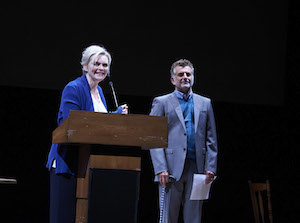According to the gospel of Dorothy, there’s no place like home. But if like Harvard University professor of linguistics Alice Howland (Sharon Small, with Eva Pope playing her inner voice Herself) you “don’t know which way is home”. Or, worse, forget where your bathroom is, in one of the most unsettling scenes in Christine Mary Dunford’s stage adaptation of Lisa Genova’s bestselling debut novel. Then no amount of ruby-slippered heel clicking is going to conjure up the familiar from the clouds of confusion which mark the gradual sinking into the slow-sand of young-onset dementia, described by Alice as “living in a mixed up Dr Seuss world”.
 When confusion, memory lapses and disorientation receive triple checks, and plausible excuses such as jetlag, overwork, stress, depression, the menopause and the morning after the night before are dismissed by a tick box doctor, then the unimaginable becomes the inevitable. And, one by one, the bright lights of a successful academic career fade to black. And the beaming smiles of a close-knit but quarrelsome family – including Mark Armstrong and Ruth Ollman as chalk and cheese siblings – get lost in a crowd of strangers. A gradual hollowing of the mind mirrored in Jonathan Fensom’s simple but effective stage design which over the course of an unbroken ninety minutes empties from a jam-packed jumble of domesticity (fridge, kitchen table, settee, sink) to a timeless space in which Alice and her now forgotten husband John (Martin Marquez) share a moment of happiness.
When confusion, memory lapses and disorientation receive triple checks, and plausible excuses such as jetlag, overwork, stress, depression, the menopause and the morning after the night before are dismissed by a tick box doctor, then the unimaginable becomes the inevitable. And, one by one, the bright lights of a successful academic career fade to black. And the beaming smiles of a close-knit but quarrelsome family – including Mark Armstrong and Ruth Ollman as chalk and cheese siblings – get lost in a crowd of strangers. A gradual hollowing of the mind mirrored in Jonathan Fensom’s simple but effective stage design which over the course of an unbroken ninety minutes empties from a jam-packed jumble of domesticity (fridge, kitchen table, settee, sink) to a timeless space in which Alice and her now forgotten husband John (Martin Marquez) share a moment of happiness.
Life is like a butterfly, says Alice. Beautiful and short, but not tragic. A fitting description of Dunford’s adaptation, directed by David Grindley in a co-production by The Infinite Group and Leeds Playhouse, which focuses as much on the person behind the label (who, though riddled with dementia, is as the title suggests “Still Alice”, still a wife, still a mother, still a human being with independent thoughts and feelings) as it does on the family undergoing the life-changing event. Much of this is down to Small’s measured performance which is quietly heartbreaking; but also through her frank and often humorous conversations with Herself who exemplifies the qualities which people living with dementia most value in others: compassion, patience and, erm, love.
- REVIEW: Orphans @ Edinburgh King’s Theatre ⭐⭐⭐⭐ - 13th April 2022
- REVIEW: Everybody’s Talking About Jamie @ Edinburgh Festival Theatre ⭐⭐⭐⭐ - 30th March 2022
- REVIEW: Sheila’s Island @ Edinburgh King’s Theatre - 2nd March 2022
